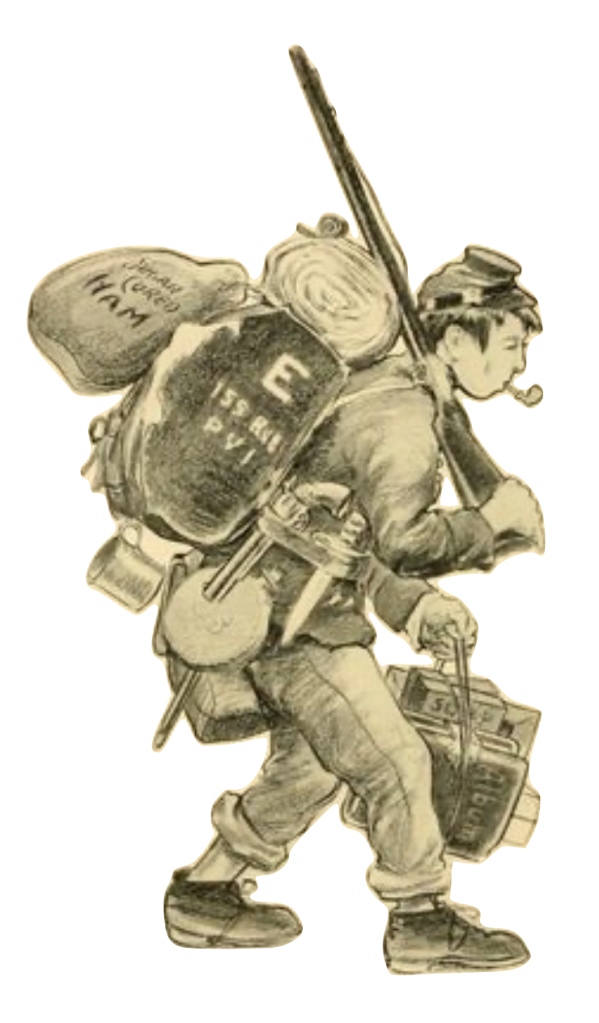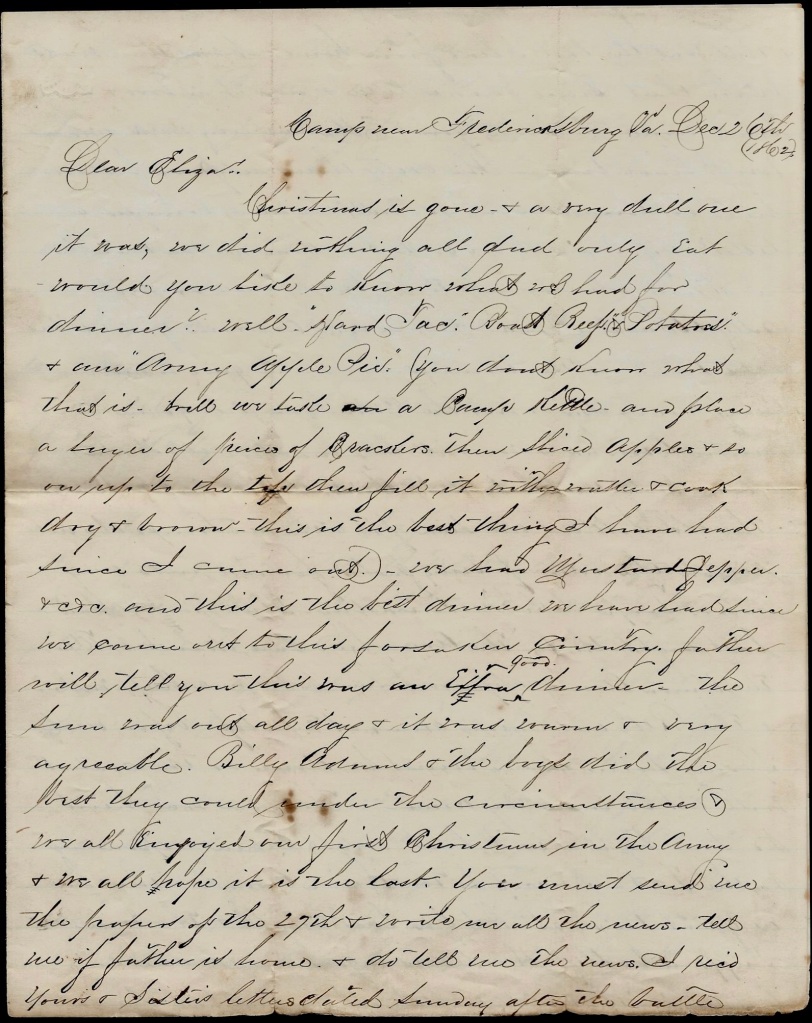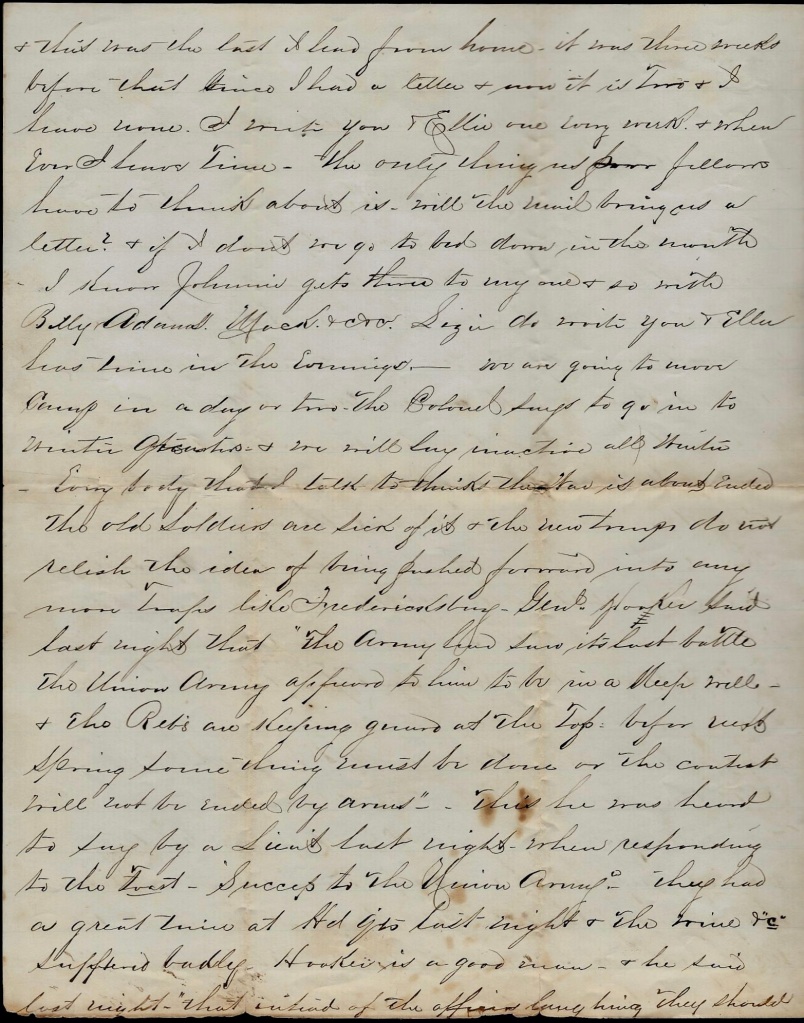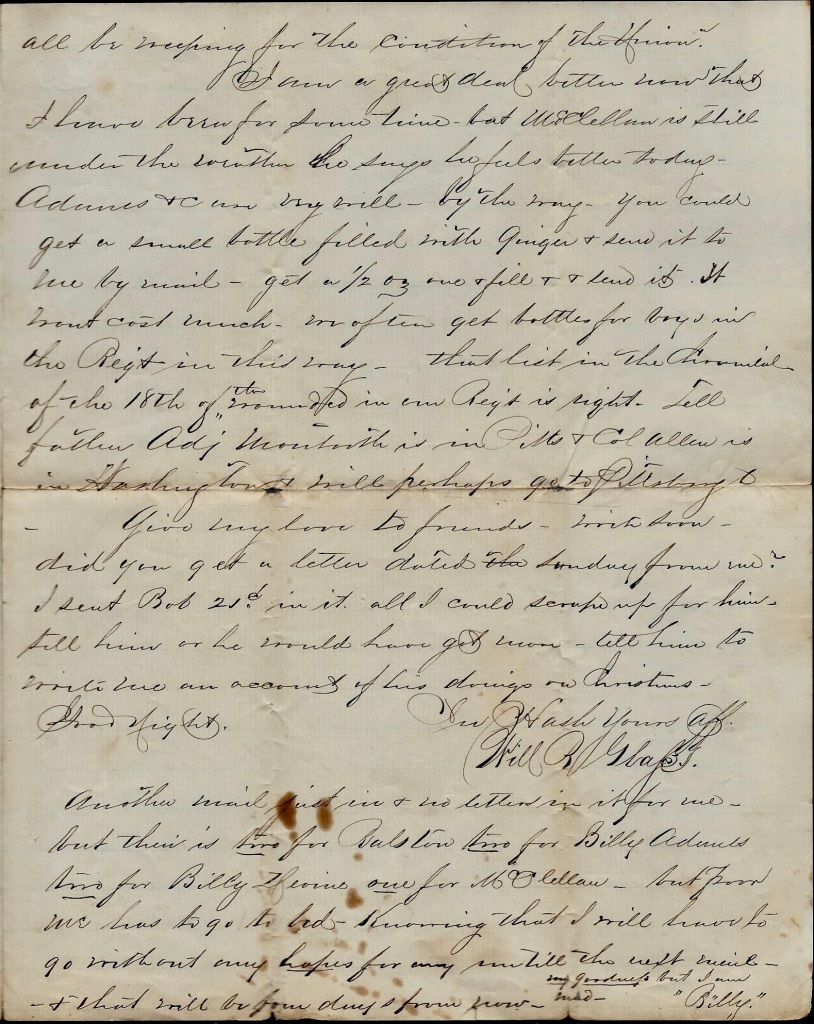The following letter was written by William B. Glass (1843-1888) who was working as a clerk in Pittsburgh, Allegheny county, Pennsylvania, at the time of his enlistment on 22 August 1862 in Co. F, 155th Pennsylvania Infantry as a corporal. He was promoted to commissary sergeant thereafter. William wrote the letter to his sister Eliza Glass (1830-1900). I believe his father was John P. Glass (1822-1868) who enlisted in April 1861 to serve as captain of Co. A, 74th New York Infantry. He was promoted to Lieut.-Colonel of the regiment in April 1862 but resigned in December 1862.

The 155th Pennsylvania Volunteers were issued standard union attire, consisting of a dark blue forage cap, a 9- button frock/dress coat (thigh length coat) of the same color with blue piping, 4-button dark blue sack coat, and light blue trousers, and brogans. Later in the war, January 1864, they were outfitted in a Zouave uniform. When they were first organized, they were issued surplus Belgian Rifles with sword bayonets. These weapons upon inspection in Washington, D.C. were determined to be unfit for use in battle, by Captain A.T.A. Torbert, USA. The men of Co. K remarked in their history that “The guns were said to kill at 1,000 yards but on examination we found they would not be dangerous to the enemy unless we got close enough to bayonet or club him” The government then issued old style muzzle loader, “Buck & Ball”, Springfield Rifles, more known as Harper’s Ferry Rifles. These weapons only proved to be effective at very close range, not being much use to the combat of the time. After the Battle of Gettysburg, Colonel Cain who had been requesting more effective weapons for his men, collected newer 1861 Springfields from the thousands of dead union soldiers. Which they would continue to use till the end of the war.
Transcription
Camp near Fredericksburg, Va.
December 26th 1862
Dear Eliza,
Christmas is gone and a very dull one it was. We did nothing all day—only eat. Would you like to know what we had for dinner? Well, “Hard Tac,” roast beef, potatoes, and our “Army apple pie.” You don’t know what that is. Well, we take a camp kettle and place a layer of pieces of crackers, then sliced apples, and so on up to the top, then fill it with water and cook dry and brown. This is the best thing I have had since I came out. We had mustard and pepper, &c. and this is the best dinner we have had since we came out to this forsaken country. Father will tell you this was an extra good dinner. The sun was out all day and it was warm and very agreeable.
Billy Adams and the boys did the best they could under the circumstances & we all enjoyed our first Christmas in the Army & we all hope it is the last. You must send me the papers of the 27th and write me all the news. Tell me if father is home & do tell me the news. I received yours and sister’s letters dated Sunday after the battle & this was the last I had from home. It was three weeks before that since I had a letter & now it is two and I have none. I wrote you and Ellie one last week & whenever I have time. The only thing us poor fellows have to think about is, will the mail bring us a letter? And if it don’t, we go to bed down in the mouth. I know Johnnie gets three to my one & so with Billy Adams, Mack, &c. Lizzie, do write. You and Ellie has time in the evenings.
We are going to move camp in a day or two. The Colonel says to go into winter quarters & we will lay inactive all winter. Everybody that I talk to think this war is about ended. The old soldiers are sick of it and the new troops do not relish the idea of being pushed forward into any more traps like Fredericksburg. General Hooker said last night that, “The Army had seen its last battle. The Union Army appeared to him to be in a deep well and the Rebs are keeping guard at the top. Before next spring, something must be done or the contest will not be ended by arms.” This he was heard to say by a Lieutenant last night when responding to the toast, “Success to the Union Army.” They had a great time at headquarters last night and the wine, &c. suffered badly. Hooker is a good man & he said last night “that instead of the officers laughing, they should all be weeping for the condition of the Union.”
I am a great deal better now that I have been for some time, but [George P.] McClelland 1 is still under the weather. He says he feels better today. Adams &c. are very well. By the way, you could get a small bottle filled with ginger and send it to me by mail. Get a half ounce one and fill and send it. It won’t cost much. We often get bottles for boys in the regiment in this way. That list in the Chronicle of the 18th of the wounded in our regiment is right. Tell father Adj. [Edward A.] Montooth is in Pittsburgh & Col. Allen is in Washington & will perhaps go to Pittsburgh.
Give my love to friends. Write soon. Did you get a letter dated Sunday from me? I sent Bob 21 cents in it—all I could scrape up for him. Tell him or he would have got none. Tell him to write me an account of his doings on Christmas. Good night.
In haste. Yours affectionately, — Will B. Glass
Another mail just in and no letter in it for me, but there is two for Ralston, two for Billy Adams, two for Billy Devine, one for McClelland—but poor me has to go to bed knowing that I will have to fo without any hopes for any until the next mail & that will be four days from now. My goodness but I am mad. — “Billy”







